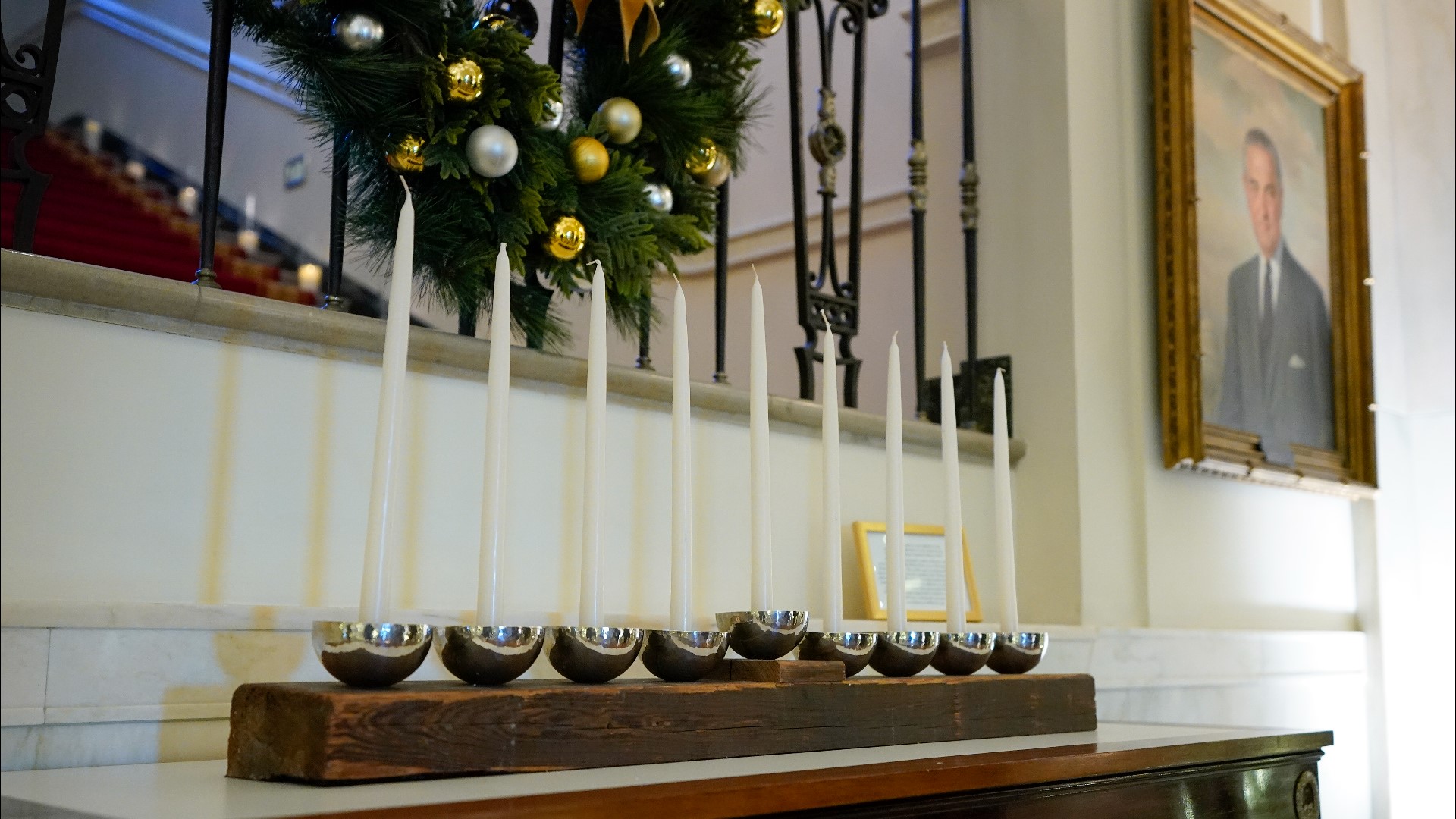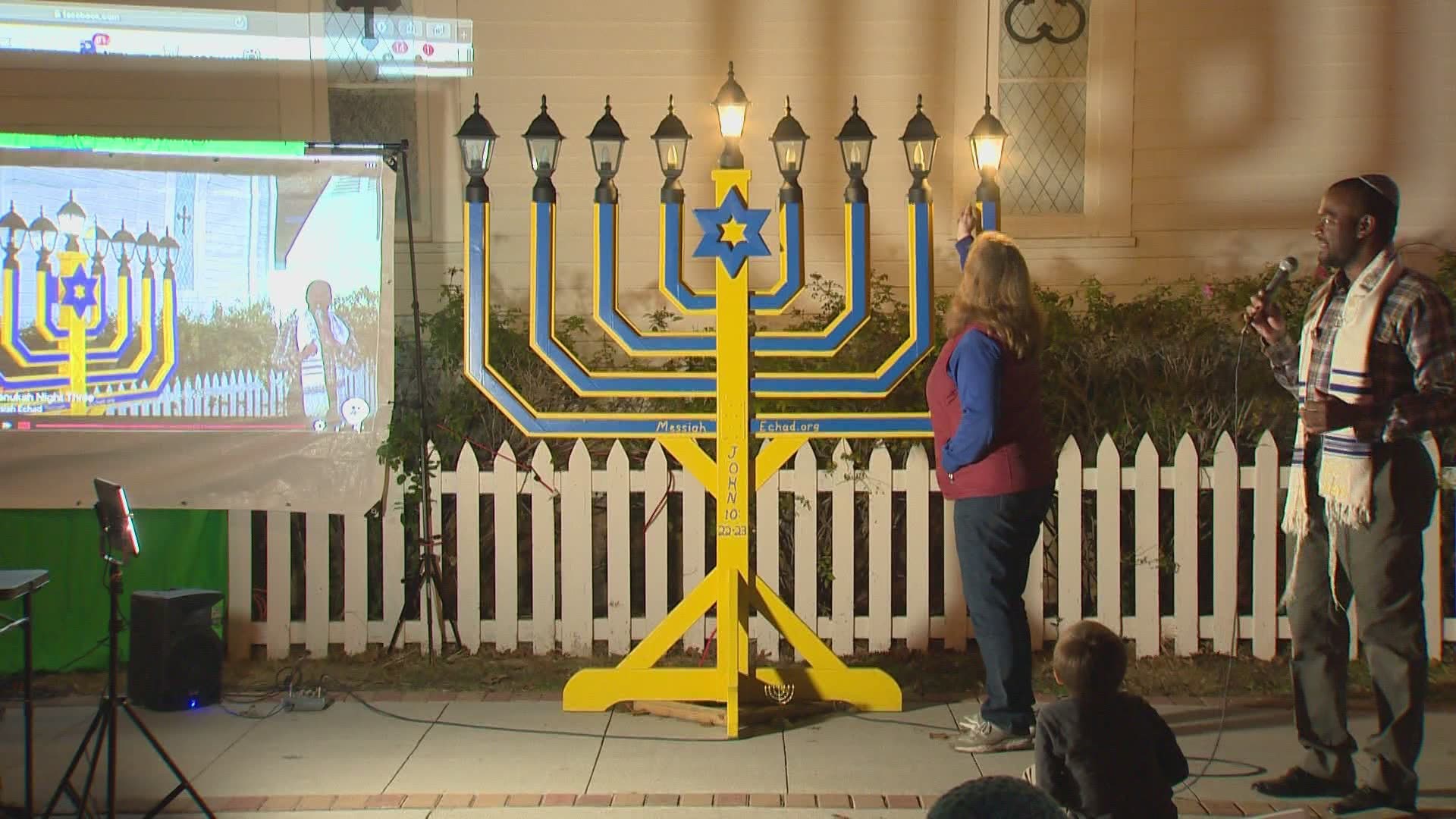What is the Jewish winter holiday of Hanukkah about?
Chag Urim Sameach! Let's learn about the Festival of Lights before the menorah is lit.

Chanukah, also commonly spelt as "Hanukkah" in North America, is the Jewish "Festival of Lights" in the winter months. But what exactly is the eight-day holiday about?
Luckily enough, KVUE's Sam Searles' favorite holiday growing up was Chanukah and can explain every detail for you this season!
When is Chanukah celebrated?
The celebration of Chanukah takes place on the evening of the 25th night of the Hebrew month Kislev and continues for eight nights. The Gregorian calendar month that corresponds to Kislev is the timespan between November and December. This year, Chanukah starts on the evening of Dec. 18 and lasts until the night of Dec. 26.
You might notice the spelling of "Chanukah" is a little different from what people are used to. The word is Hebrew for "dedication," but there are different spellings because the Hebrew spelling translates differently into English, causing there to be variants. The main difference is "Chanukah" with a C is traditional, versus "Hanukkah" with two Hs and no C is more casual and widespread.
History of Chanukah
With every holiday within Judaism, there is a story spanning back thousands of years that we honor every year. The story of Chanukah begins 2,000 years ago during the time period that Israel was under Syrian rule, by the dynasty of the Seleucids.
The king, Antiochus III, allowed Jewish people to live within the dynasty with certain privileges. When he died, his son, Antiochus IV Epiphanes, wasn't as kind. Judaism as a whole was banned and the Jews were forced to worship their Greek gods instead. In the process of this, the Holy Temple fell out of the Jews' hands and into the control of the Syrians, which led to the Temple's defiling.
When the Jews did not worship the Greek gods, the retaliation was a mass murder of those that rebelled. The Maccabees, the sons of Mattityahu, an old priest that stood up to Syrian officers, fought "in defense of God's Torah." The Maccabees proceeded to not only defeat the Syrian army but free the Temple.
Once in the Temple, the golden menorah had been stolen and replaced with one made of cheaper metal. The only oil left to light it was a small amount of pure olive oil, with only enough to last one night. The miracle of Chanukah is that the oil lasted eight nights, signaling to the Jews that God once again protected them.
One important thing to know is that the story of Chanukah will not be found in the Torah, because it happened after the books were written. However, it can be found in the Talmud in the books of Maccabee.
How to light the menorah
The menorah has nine placements for candles, with the middle candle being the shamash, which is Hebrew for "attendant," which lights all the other candles each night. The first night is one candle in addition to the shamash, with all eight candles being lit by the time Chanukah is over.
As the menorah is lit, blessings are stated and recited in Hebrew. Additionally, songs are sung at the end of the lighting by some families, but not all participate.
Traditional foods and games
One of the best part of Jewish holidays is the food and games associated with the season!
To honor the oil lasting eight days, the tradition is to make food fried in oil. Latkes, or "potato pancakes," are flattened, latticed potatoes that are fried in a pan of oil that are paired with applesauce or sour cream as a dip. Another classic is the sufganiyah, or "doughnut," that is fried and filled with jelly.
While you're eating latkes and sufganiyot, don't forget to spin the dreidel! The game of dreidel is essentially a gambling game played with "gelt," or money, while spinning a dreidel. The goal of dreidel is to win the entire pot of money, which players contribute to on each turn.
The dreidel has four symbols:
- Nun - Hebrew for "none." Land on this and you do nothing.
- Gimmel - Hebrew for "great" or "large." This allows the player to win the entire pot!
- Shin - Hebrew for "it was" or "it happened," but in the context of the game it means "half." The player earns half of what is in the pot.
- Heh - Hebrew for "there," but in the context of the game it means "to put in." The player has to put one of their pieces of gelt into the pot.
You can find a list of the rules here.
Chag Urim Sameach! (Happy Festival of Lights!)


